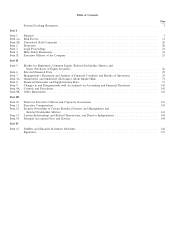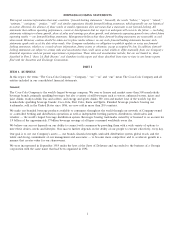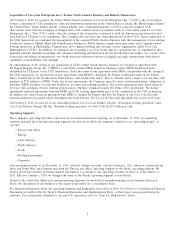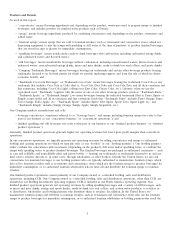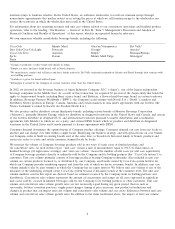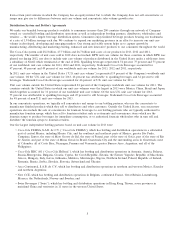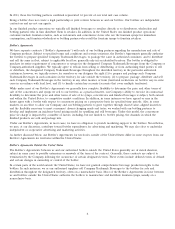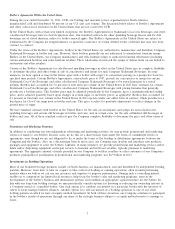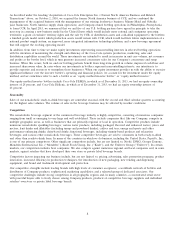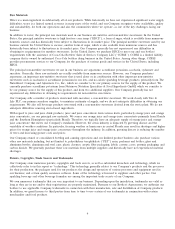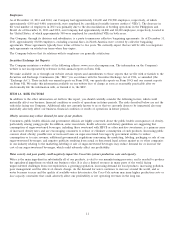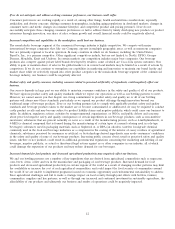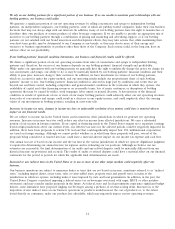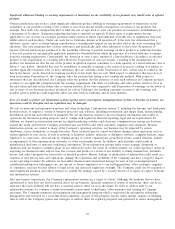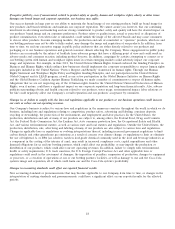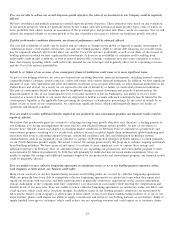Coca Cola 2013 Annual Report Download - page 12
Download and view the complete annual report
Please find page 12 of the 2013 Coca Cola annual report below. You can navigate through the pages in the report by either clicking on the pages listed below, or by using the keyword search tool below to find specific information within the annual report.Governmental Regulation
Our Company is required to comply, and it is our policy to comply, with all applicable laws in the numerous countries throughout
the world in which we do business. In many jurisdictions, compliance with competition laws is of special importance to us, and our
operations may come under special scrutiny by competition law authorities due to our competitive position in those jurisdictions.
In the United States, the safety, production, transportation, distribution, advertising, labeling and sale of many of our Company’s
products and their ingredients are subject to the Federal Food, Drug, and Cosmetic Act; the Federal Trade Commission Act; the
Lanham Act; state consumer protection laws; competition laws; federal, state and local workplace health and safety laws; various
federal, state and local environmental protection laws; and various other federal, state and local statutes and regulations. Outside
the United States, our business is subject to numerous similar statutes and regulations, as well as other legal and regulatory
requirements.
Under a California law known as Proposition 65, if the state has determined that a substance causes cancer or harms human
reproduction, a warning must appear on any product sold in the state containing that substance. The state maintains lists of these
substances and periodically adds other substances to these lists. Proposition 65 exposes all food and beverage producers to the
possibility of having to provide warnings on their products in California because it does not provide for any generally applicable
quantitative threshold below which the presence of a listed substance is exempt from the warning requirement. Consequently, the
detection of even a trace amount of a listed substance can subject an affected product to the requirement of a warning label.
However, Proposition 65 does not require a warning if the manufacturer of a product can demonstrate that the use of that
product exposes consumers to a daily quantity of a listed substance that is:
• below a ‘‘safe harbor’’ threshold that may be established;
• naturally occurring;
• the result of necessary cooking; or
• subject to another applicable exemption.
One or more substances that are currently on the Proposition 65 lists, or that may be added in the future, can be detected in
Company products at low levels that are safe. With respect to substances that have not yet been listed under Proposition 65, the
Company takes the position that listing is not scientifically justified. With respect to substances that are already listed, the
Company takes the position that the presence of each such substance in Company products is subject to an applicable exemption
from the warning requirement. The State of California and other parties, however, have in the past taken and may in the future
take a contrary position.
Bottlers of our beverage products presently offer and use nonrefillable, recyclable containers in the United States and various
other markets around the world. Some of these bottlers also offer and use refillable containers, which are also recyclable. Legal
requirements apply in various jurisdictions in the United States and overseas requiring that deposits or certain ecotaxes or fees be
charged in connection with the sale, marketing and use of certain beverage containers. The precise requirements imposed by these
measures vary. Other types of statutes and regulations relating to beverage container deposits, recycling, ecotaxes and/or product
stewardship also apply in various jurisdictions in the United States and overseas. We anticipate that additional, similar legal
requirements may be proposed or enacted in the future at local, state and federal levels, both in the United States and elsewhere.
All of our Company’s facilities and other operations in the United States and elsewhere around the world are subject to various
environmental protection statutes and regulations, including those relating to the use of water resources and the discharge of
wastewater. Our policy is to comply with all such legal requirements. Compliance with these provisions has not had, and we do
not expect such compliance to have, any material adverse effect on our Company’s capital expenditures, net income or competitive
position.
10


